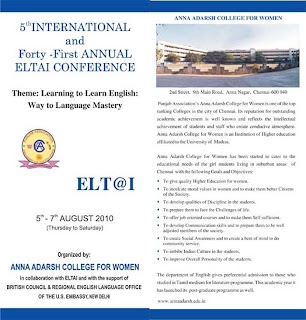Twittering is a very popular instant messaging system that lets a person send brief text messages up to 140 characters in length to a list of followers. Launched in 2006, it lets you micro-blog your life by dashing out very short notes to a select group of friends or other subscribers, who can receive them as text messages even on their cell phones. It helps the students to message in sound bites and about what they are up to. Twittering as a useful classroom-communication tool had been experimented successfully.
To start with, the student can create a twitter account. It is just like setting up an email account. Twitters are in reverse chronological order, according to time, with the newest at the top. Students can be asked to follow the persons or community they like or their classmates, teachers and the links of their tastes. So that they can view what is going on with their classmates and other organizations. For example, Microsoft keeps updating its twitter every minute. The followers could be updated with these instant messages. Important companies like CNN and BBC also use twitter to post their news.
As twitter answers the question “What are you doing?” the first assignment can be some fifteen messages to be posted in a week saying what they are doing by the time they login. This will be a good assignment for the students and it helps to get to know twitter, better. Scrolling through random Twitter messages can't explain the appeal. You have to do it — and, more important, do it with friends. This assignment of posting a minimum of messages will make them access it, and find out what is going on around. The teacher can make corrections in the posted messages. The immediacy of the messages help the students feel like more of a community. One thing should be remembered here is that you cannot edit the posted messages. Care should be taken to avoid any errors before posting. Think before you post is the rule. If the post exceeds the limited 140 words, never mind to tweet again.
The next step can be posting of the messages like what they are doing at present. This will be more in present continuous tense to be instant. This will make the teachers to know the students more personally and help them in building activities based on this accordingly. Then they can be asked to reply or comment over their friend’s post. They develop a kind of intimacy in this way over one another, even outside the classroom. The students can reply not only their followers and the links they are following, they can also comment on other public links using @reply services. They can act more or less as a critic.
Teachers can make timely announcements without need for reliable internet service. It hardly takes a second for a message to appear on Twitter, just like group messaging in mobile services. Moreover, as the twitter services are linked to their cell phones, it serves a big time saver for the students as they don’t have to visit the blog/website/mail on a daily basis. It helps to make connections to people in our field and points out to articles and blog posts, we wouldn’t have found otherwise. The tinyURL.com which allows to fit any url within your tweet enables us to log in to some interesting links.
Twitter allows you to find learning partners through finding someone who share the same interests/subject area as you. You can just click on their picture and choose follow and you can click on their network and explore/follow some of their contacts. If someone does not “live up to your expectations”, remove them from your network. You can at some time or other write a story collaboratively with people across the world.
Twitter is actually good for teaching grammar. Because of its short form those who tweet often abbreviate and abuse grammar rules, developing their own unique “twitter rules.” This helps to demonstrate, both how all communication needs rules/structure and how important something like a comma or a period can be. Some Tweets become really ambiguous because of their lack of punctuation.
‘Yammer’ is another micro-blogging site designed exclusively for business purpose. And it is quite a good thing to know that yammer also tweets. Yammer can be updated by linking it to twitter. ‘Edmodo.com’ is another micro-blogging site which is specially designed for teachers and students. The link between students and teachers is rightly done, which avoids other interruptions. Here the posts can be edited, commented, replied as well. ‘Buzz’ of google is another micro-blogging application which is more or less like a twitter. And twitter updates are as well updated in the google buzz.
Tweeting helps one to know the social media which keeps one in pace with communication technology. So much of learning is going on inside a student’s head and you don’t know what they’re getting and how they apply what they’re learning. Twitter can give insights about the process and that can help educators make teaching more relevant. It increases the habit of writing in oneself. It opens our eyes to new topics and reading materials. Twitter is a quick way to network with colleagues. You can ask and answer questions, learn from experts, share resources, and react to events on the fly. Critics argue that it's nothing but a high tech distraction. Meanwhile, new ideas for using Twitter in education continue to emerge and evolve. The best way to weigh the pros and cons of this free tool is to try it for yourself.


